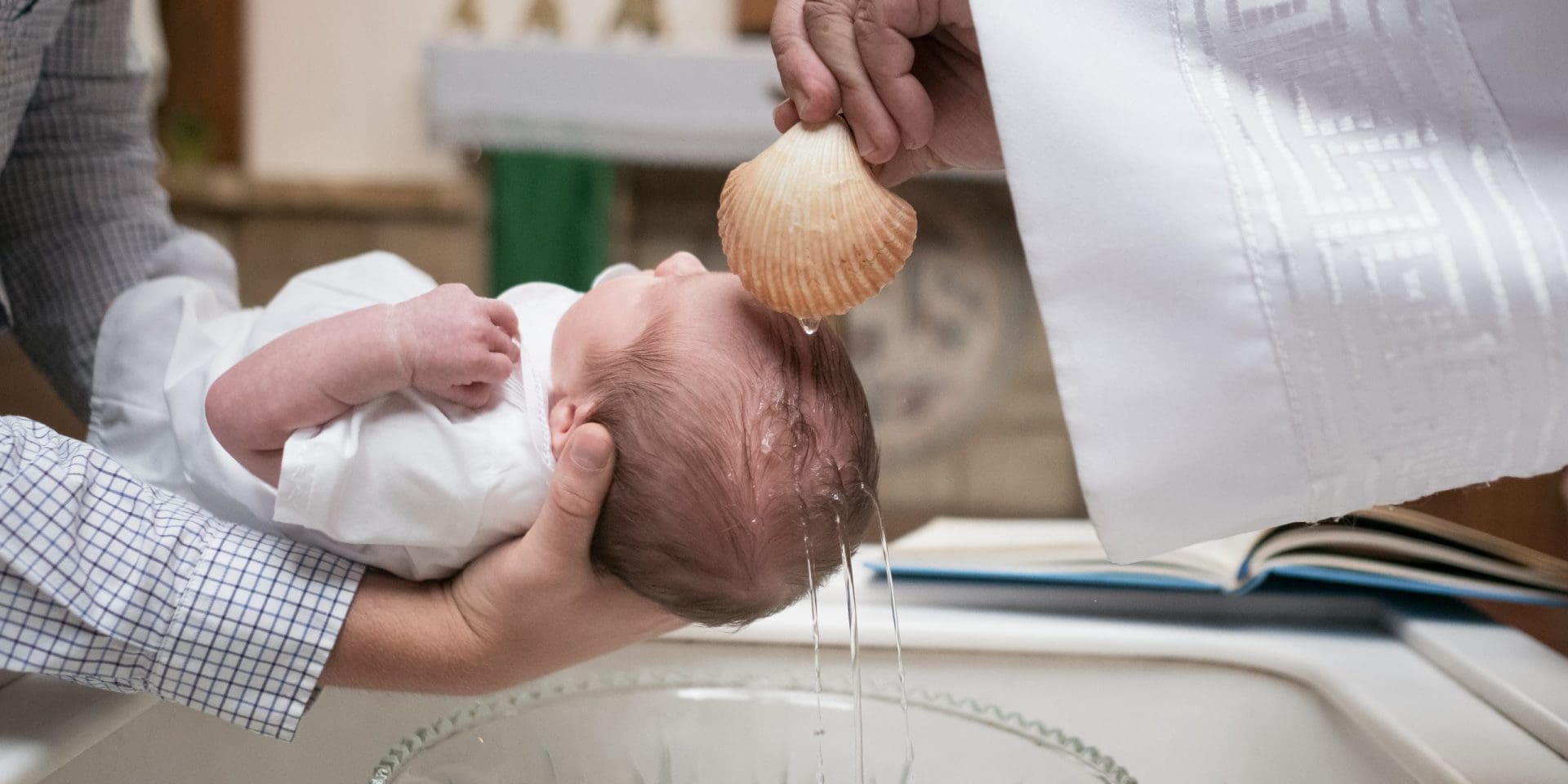Q:
“In Acts we read a lot about baptism. Some people believe in infant baptism vs. adult baptism. Some believe in sprinkling vs. immersion. What is correct according to the Bible? How should we be baptized?”
Lisa
Hey Lisa, this is quite the can of worms! Baptism is, perhaps, one of the most divisive topics in the Church today, a tension trickling down from the Reformation, because it is intimately tied to salvation, gospel message, and great commission as commanded by Christ: “Go therefore and make disciples of all nations, baptizing them in the name of the Father and of the Son and of the Holy Spirit, teaching them to observe all that I have commanded you,” (Matthew 28:18-20) and again, “Go into all the world and proclaim the gospel to the whole creation. Whoever believes and is baptized will be saved, but whoever does not believe will be condemned.” (Mark 16:15-16) The root of your questions comes from whether this “baptism” is by water, Spirit, or both. To be clear, no one denies that spiritual baptism grants salvation. What is often rejected, particularly by Baptists, is the necessity of water: Must a person be baptized with water to be saved? Does the spiritual baptism work through the physical process? Or in other words, does God need water to save a person? Which is another way of saying God will always use water to save someone. The necessity of water baptism is further intensified by eternal security or the fear of losing salvation.
Either way, all views depend on whether spiritual baptism can happen independent of water baptism, or if salvation does not rely on water baptism happening first. If so, then the process of water baptism is not always tied to salvation necessarily–––pending personal circumstances.
Due to the tension of this topic, which typically increases the space required to answer a question well, I will just answer your questions head on based on Scripture alone, as you requested, rather than drag the coattails of Church history through the mud (I’ll write a more thorough commentary on this issue at a later date).
Immersion v. Sprinkling
Immersion is the most accurate Biblical expression of baptism. The word baptism comes from the Greek verb baptizō, meaning “to dip” or “to immerse”. The supporting evidence for this position is insurmountable, from explicit mentions to symbolic references: Philip immerses the Ethiopian eunuch (Acts 8:39) and Paul parallels baptism as one who is “buried” and “raised” with Christ (Romans 6:4; Colossians 2:12), and Peter says baptism is not “a removal of dirt from the body”, which implies the process of water baptism is immersion because if Peter was sprinkling water on people, then dirt is not being removed; Peter also likens baptism to the Flood, whereby eight souls were saved through water (1 Peter 3:20-21), which is also a pertinent antitype for the Gentiles who historically perished in the flood by immersion–––our old self has died and the new self will be raised through Christ (Romans 6:4-8; Galatians 2:20). Although not mentioned in the Bible, mikvehs were commonly used in ancient Israel for ceremonially cleansing, which is a full immersion bath. While sprinkling is used in the Old Covenant when the priest at the altar would dip his brush and sprinkle the blood of the sacrificed lamb over the congregation of Israel to forgive sins, the New Covenant equivalent for this symbol is wine, and we do not sprinkle wine on people. All biblical evidence points to immersion.
That said, that does not mean the process of water baptism, whether by immersion or sprinkling or pouring, amounts to salvation. From what I understand, in the early Church, if immersion was not possible, baptism would be performed by pouring or sprinkling three times in the name of the Father, Son, Holy Spirit. All that’s been established thus far is that immersion is the original process of baptism. Now, both sides will argue in favour of one over the other, for how we should express baptism. While immersion is the optimal expression of water baptism, it is more imperative not to be too dogmatic or legalistic about how one is water baptized as an indication of eternal security. If Protestants, particularly Baptists, believe that water baptism is a reflection or a symbol of a true spiritual covenant with God, then whether someone was baptized by immersion or sprinkling or pouring is not a root issue. Is that someone fully dedicated to God? Water baptism is an expression of that commitment. Consider prisoners on their deathbed or in concentration camps who sincerely come to Christ and cannot be immersed in water, or physically disabled who likewise cannot be fully immersed, even some infants with health defects. The problem, here, is favouring a systematic practice over the spiritual reality of Christ’s atoning work and a person’s heart.
Infant v. Mature Baptism
Infant baptism is not explicitly mentioned in the Bible. The strongest evidence for infant baptism is when entire households were baptized, such as with the centurion Cornelius (Acts 10–11:1-18), Lydia (Acts 16:14-15), Philippian jailer (Acts 16:30–34), synagogue leader Crispus (Acts 18:8), and Stephanas (1 Corinthians 1:16). This appears to have been a common practice in the early Church. If thousands of households were baptized by the apostles, then I see no reason to rule out infants and children from among the term “household”. After all, Paul references people baptized on behalf of their dead friends and relatives as a defense of the resurrection! (1 Corinthians 15:29) This practice could have been for the elderly as well as children, we don’t know.
With that said, I see no reason to rule it in, either. None of the passages are strong enough to support infant baptism as salvific dogma, or that water baptism itself guarantees the infants salvation. There is no Biblical evidence for it or against it–––the Bible is silent on the subject. All that’s been established so far is that infants/children could have been baptized by the apostles, not that it’s mandated to do so. Most, if not all, evidence points to people willingly desiring baptism based on the intentions of their heart. Consider in Acts 10–11 when Peter brings a message of salvation to Cornelius and his “household”, the “Holy Spirit fell on all who heard the word” and were baptized by the Spirit before they were baptized by water (Acts 10:44-48, 11:15-17). Presumably, Cornelius’ household could include infants and children, and those not old enough to know better, but this does not mean it did nor does it mean that we should baptize infants in order to save their souls. The Holy Spirit fell on all who “heard” the word and spoke in tongues–––infants do not hear, speak, or understand, nor can they repent of sins “as an appeal to God for a good conscience” (1 Peter 3:21). The Biblical ground for infant baptism as necessary dogma to save a child’s soul is just not strong enough, here. Water baptism is always fulfilled by a repentant heart: “Then to the Gentiles also God has granted repentance that leads to life.” (Act 11:18) So, repentance is the primer and is fulfilled by the baptism of the Holy Spirit (Acts 18:24-28, 19:1-6) Further consider that God saved Nineveh when they repented and they, too, were outside the Old Covenant (Matthew 12:41). Infant baptism as dogma, then, requires theological harmonization implied from other passages, which I will not get into detail today[1].
Therefore, based on Scripture alone, infant (water) baptism is not explicitly mentioned nor regarded as necessary dogma sufficient for salvation. The public confession of faith and covenantal, repentant declaration to God is the primer for the baptism of the Holy Spirit, not the washing of dirt, as Peter says it. As Paul corroborates: “if you confess with your mouth that Jesus is Lord and believe in your heart that God raised him from the dead, you will be saved.” (Romans 10:9) But baptism is not restricted to a one-time event, it’s a lifetime commitment. For God chose you “to be saved, through sanctification by the Spirit and belief in the truth.” (2 Thessalonians 2:13)
Conclusion
In the case of Cornelius, the takeaway is that baptism of the Spirit is a distinct process from water baptism. Also consider in Acts when water baptism did not come with the gift of the Holy Spirit but required the apostles to lay hands on them (Acts 8:14-24, 18:24-28, 19:1-6). The thief on the cross who reviled Christ then repented (Luke 23:32-43; Matthew 27:44), a sort of catch all event for a lot of Protestant doctrine it seems, is also another example of a person being saved on their deathbed who was unable to be water baptized. This is important because while he was unable to be water baptized, Jesus recognized his repentant heart and granted him salvation. But to be fair, this instance should chiefly be used to show God’s mercy given the circumstance, not as a rule against water baptism.
So, based on Scripture alone, one cannot make sound doctrine that salvation or spiritual baptism comes through water baptism exclusively, simultaneously, or necessarily, as if the Spirit is restricted to the water itself. God does not need water to save a person, nor does he always save people who are water baptized. Hitler was infant baptized for goodness’ sake![2] This may also be why there is a contrast between the two throughout the NT: “Then I remembered the word of the Lord, how He said, ‘John indeed baptized with water, but you shall be baptized with the Holy Spirit.’” (Acts 11:16, 1:5, 19:1-6; Luke 3:16; Matthew 3:11; John 1:26-27; Mark 1:8) The doctrine of Infant baptism fails in a theological framework of eternal security.
I’m skimming over the surface of the waters, here Lisa, but I hope this offers some clarity on the subject. God Bless!

Matlock Bobechko is the Chief Operating/Creative Officer of Bible Discovery. He is an eclectic Christian thinker and writer, award-winning screenwriter and short filmmaker. He writes a blog on theology, apologetics, and philosophy called Meet Me at the Oak. He is also an Elder at his local church.
[1] Reformed theology upholds infant baptism is the next step in the Abrahamic covenant of infant circumcision on the 8th day. But this fails to recognize that if the Abrahamic covenant was in the flesh, and circumcision of the heart is what mattered most (Deuteronomy 10:12-17, 30:6; Romans 2:25-29; Colossians 2:11-14), then baptism acting as an extension of a physical sign fails because it leaves no physical indication that a person was baptized. The fact that water baptism leaves no physical marker (like sin washing away) is part of its spiritual sign. Indeed, baptism is antithesis to the fleshly sign; for instance, men and woman are now baptized, not just men (Acts 8:12). Baptism is a purely spiritual sign, the beginning of a covenant relationship with God, and the physical ordinance is a shadow of new creation to come (John 3:3-8).
[2] It is still possible that someone of his immoral character could have repented on his deathbed and be saved. I highly doubt it, but I reserve the possibility of it because I hesitate to take the judgment seat of God, here, and declare him condemned (Jude 1:9). But humanly speaking, all indicators suggest Hitler would not have done so.






